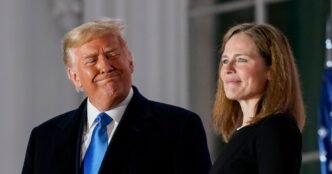President Donald Trump’s sweeping bid to deport foreign students who have condemned the war in Gaza has been brought to a standstill by federal judges who have repeatedly ruled against the administration, according to an NBC News review of recent court filings.
First, Mahmoud Khalil, a former Columbia University graduate student, was arrested and transported hundreds of miles from his home. Then a graduate student at Tufts University in Massachusetts, Rümeysa Öztürk, was grabbed off the street by masked plainclothes federal agents. A third student, Badar Khan Suri, a rgetown University postdoctoral scholar and professor, was arrested at his home, while another Columbia student, Mohsen Mahdawi, was detained at his naturalization interview.
Since then, though, federal judges have rejected the administration’s arguments about court jurisdiction and the continued detention of three of the four students. Federal judges freed Öztürk, Mahdawi and Suri. And a ruling on Khalil’s possible release is expected soon.
In separate legal setbacks for the administration, federal appeals courts upheld lower courts’ orders requiring the government to transfer Öztürk to Vermont for a bail hearing and to release Mahdawi. And late last month, a judge issued an injunction blocking the administration from terminating the legal status of international students at universities across the United States.
The judges have been appointed by both Republican and Democratic presidents, including Trump.
“It has been very heartening to see the courts recognize the legal issues at play here and recognize that what the administration has been doing is unconstitutional,” said Esha Bhandari, deputy director of the American Civil Liberties Union, which represents several of the students. “This reinforces just how important it is to have an independent judici that can protect individual rights and act as a check when the executive branch overreaches.”
Assistant Homeland Security Secret Tricia McLaughlin predicted in a statement to NBC News that the administration would eventually prevail in court. “These rulings delay justice and seek to kneecap the President’s constitutionally vested powers,” she said. “We expect a higher court to vindicate us in this. We have the law, the facts, and common sense on our side.”
The Justice Department did not respond to a request for comment.
Rarely used provision
The Trump administration’s prim legal argument is that foreign students and scholars can be deported under an obscure provision of the Immigration and Nationality Act of 1952. The law allows the secret of state to remove noncitizens whose presence in the country would have “potentially serious adverse foreign policy consequences for the United States.”
Trump administration officials have argued that students who engaged in protests in support of Hamas, a foreign terrorist organization, contributed to antisemitism on college campuses.
Khalil and the other students have denied allegations of antisemitism and of providing support to Hamas or any other terrorist organization, and they say they have not participated in protests backing Hamas. None of the four face any publicly known criminal charges.
The government has yet to disclose any evidence linking the students to Hamas or praising the group, which the United States designated a foreign terrorist organization in 1997.
Attorneys representing the students have argued that their clients’ detainment and the efforts to deport them are retaliation for constitutionally protected free speech and advocacy for Palestinian rights.
Khalil, a legal permanent resident, played a key role in the student protests at Columbia University last year by leading negotiations between the protesters and university officials. The other Columbia student, Mahdawi, was a prominent organizer of the pro-Palestinian demonstrations on campus. Öztürk, a graduate student, wrote an op-ed in her student newspaper at Tufts University that was critical of the university’s response to the war in Gaza.
Last week, a federal judge in New Jersey ruled against the administration’s claim that Khalil’s beliefs and speech had adverse consequences for U.S. foreign policy. It was the first time a judge has said the government’s prim justification for deporting Khalil was most likely unconstitutional.
U.S. District Judge Michael Farbiarz said Secret of State Marco Rubio failed to “affirmatively determine” that Khalil’s alleged conduct has affected U.S. relations with another country, adding that deporting Khalil under the provision would be “unprecedented.”
In response to a request for comment, a State Department spokesperson said, “We don’t comment on pending litigation.”
Lora Ries, director of the Heritage Foundation’s border security and immigration center, said the judges were unfairly blocking Trump.
“There have been a lot of activist judges issuing rulings against the Trump administration,” Ries said. “There is a clear effort, beyond even what we saw in Trump’s first term, to slow down a lot of the efforts to enforce immigration law.”
Daniel Kanstroom, a professor at Boston College Law School, predicted that judges would continue to rule in international students’ favor.
“I think the courts are going to view this period as one in which the judici should and needs to exert a little more force and authority than it might do in other circumstances,” Kanstroom said. “Just to bring the tone down a little bit and bring us back to a more normal interaction among the three branches.”
Detention losses
In April, U.S. District Judge ffrey Crawford ruled that Mahdawi, 34, a U.S. permanent resident who was born and raised in a refugee camp in the West Bank, should be released from a Vermont immigration detention facility on bail. Crawford said Mahdawi’s continued detention would be likely to have a “chilling effect on protected speech.”
The government opposed freeing Mahdawi, citing law enforcement records that indicated he was “involved in and supporting antisemitic acts of violence” and that he had “an interest in and facility with firearms for that purpose,” according to court documents filed under seal but reviewed by NBC News.
But in a court order, Crawford said law enforcement had determined that a Vermont gun shop owner’s accusations against Mahdawi were unsubstantiated.
In May, U.S. District Judge William Sessions III freed Öztürk from detention, writing, “There has been no evidence introduced by the government other than the op-ed,” referring to the student newspaper op-ed in which Öztürk called on Tufts to acknowledge the war in Gaza. “That literally is the case. There is no evidence here,” Sessions said.
Sessions said Öztürk’s continued detention infringed on her First Amendment and due process rights. He added that it might be justified “if the government had presented a legitimate case for it, but it has not done so.”
Legal struggle ahead
No cases involving the deportation of foreign students for their condemnation of the war in Gaza are before the Supreme Court, but they could be in the future.
Conor Fitzpatrick, a supervising senior attorney at the Foundation for Individual Rights and Expression, a nonprofit civil liberties group, said the Supreme Court has yet to address the intersection of executive power, immigration law and free speech. Until it does, the fate of foreign students and scholars in the United States remains uncertain.
“There is a real sense of unease for international students and international faculty about whether they can feel safe voicing their opinions,” Fitzpatrick said. “They’re worried about risking their immigration status, and that is a harm that is going to take a long time to undo.”
John Yoo, a law professor at the University of California, Berkeley, who served as a senior Justice Department official during the rge W. Bush administration, said the cases will create a unique challenge for the Supreme Court.
“The two things that this court has been very supportive of are coming into collision,” Yoo said. “The Roberts Court has been very deferential to the executive branch in general. On the other hand, this court has also been extremely protective of freedom of speech.”
He added, “It’s going to cause a lot of tension at the court.”













